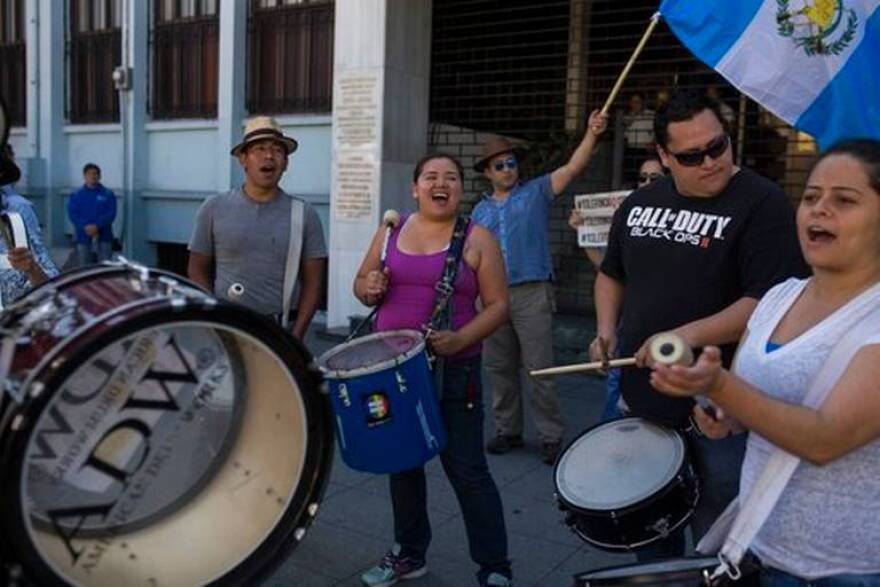COMMENTARY
In the 28 years I’ve covered Latin America, I never thought I’d write the sentence I’m about to type. But here goes:
Guatemala is a model for the U.S.
You read that right. For the moment, at least, Guatemala – a Central American country whose so-called democracy my colleagues and I have long disparaged as a dark banana-republic farce – is the beacon of the Americas. The exemplar of constitutional rule of law. One of the hemisphere’s separation-of-powers life boats.
And most important to the U.S. – Guatemala's reminding us that our institutions are still robust enough to rein in President Donald Trump’s authoritarian impulses if and when they genuinely imperil our democracy or national security someday.
READ MORE: Trump Gets Away With 'Bad Hombres' Rhetoric Here Thanks to...Bad Hombres There
Yes, I’m talking about Guatemala. I’m not kidding. Here’s why:
Last weekend, Guatemalan President Jimmy Morales – a former TV entertainer who rode into power last year on a wave of populist outrage against his country’s political establishment (not that that would remind you of anybody here) – ordered the expulsion of Iván Velásquez, head of Guatemala’s U.N. anti-corruption mission.
Guatemala - yes, Guatemala, I'm not kidding - reminds us that our own institutions are still robust enough to rein in President Trump's authoritarian impulses if and when they genuinely imperil us someday.
Morales’ stated (and bogus) reason: Velásquez, he claimed, was interfering in Guatemala’s domestic affairs. Morales’ unstated (and real) reason: Velásquez and his unit – the International Commission Against Impunity in Guatemala, or CICIG – is investigating possible malfeasance by Morales’ 2015 presidential election campaign (not that that would remind you of anybody here).
Morales has reason to be spooked. Thanks to the treaty Guatemala signed with the U.N. a decade ago, CICIG is empowered to investigate and prosecute serious crimes – like the massive customs fraud former Guatemalan President Otto Pérez is charged with. Two years ago Velásquez, a Colombian lawyer, helped force then President Pérez’s resignation and arrest. Pérez is in jail awaiting trial.
Last week Velásquez and Guatemala’s chief prosecutor, Thelma Aldana, announced they would ask the Supreme Court to strip Morales of his presidential immunity from prosecution in order to pursue their campaign finance probe.
Morales freaked out. Summoning the ghosts of Guatemalan dictators past – or maybe Richard Nixon – he declared Velásquez persona non grata and told him to head for the airport.
Here’s what happened instead: Guatemala’s high court this week sided with CICIG and nullified Morales’ petulant decree.
CONSTITUTIONAL CRISIS
To appreciate how significant that is, consider Guatemala’s corruption- and impunity-plagued next-door neighbors, Mexico and Honduras, have so far rejected CICIG-style commissions on their soil. (Last year Honduras, backed by the Organization of American States, established what critics call a watered-down if not toothless anti-corruption body known as the MACCIH). Or that one country farther south, in Nicaragua, President Daniel Ortega has all but muzzled his Supreme Court. Ditto in Venezuela, where socialist President Nicolás Maduro set himself up as a dictator this summer.

And it’s a telling coincidence that President Morales tried to kibosh Guatemala’s constitutional order on the same weekend President Trump flirted with constitutional crisis in the U.S. By pardoning Arizona sheriff Joe Arpaio – convicted this summer of thumbing his nose at a federal judge’s order – legal experts say Trump himself flipped the bird at judicial authority in this country.
“How ironic that one of these little Latin American countries Trump loves to scorn – that he’s going to build a wall to keep out – turns out this week to make him look rather shameful,” says U.S. author Francisco Goldman. He wrote the 2007 book “The Art of Political Murder,” which chronicled the 1998 assassination of a Guatemalan bishop – a crime that helped set the country on a judicial reform path.
Goldman, whose mother was Guatemalan, told me from Mexico City that perhaps an even bigger irony is that many of the judges and prosecutors leading Guatemala’s rule-of-law renaissance were educated and trained in the U.S. Flor de María García Villatoro, the judge who oversaw the trial of the bishop’s murderers – which resulted in the unprecedented convictions of three army officers – studied human rights law at DePaul University in Chicago.
“She’s part of an avant garde in Guatemala that decided to draw a line in the sand,” says Goldman, most recently author of the 2011 memoir “Say Her Name.” “They resolved to keep Guatemala from becoming a failed narco-state – and they were very smart about inviting in international help in that effort.”
This week they repaid the favor, says Goldman: “Guatemala's action should reassure Americans about the survival of their own institutions.”
Another sentence I never thought I’d write.




